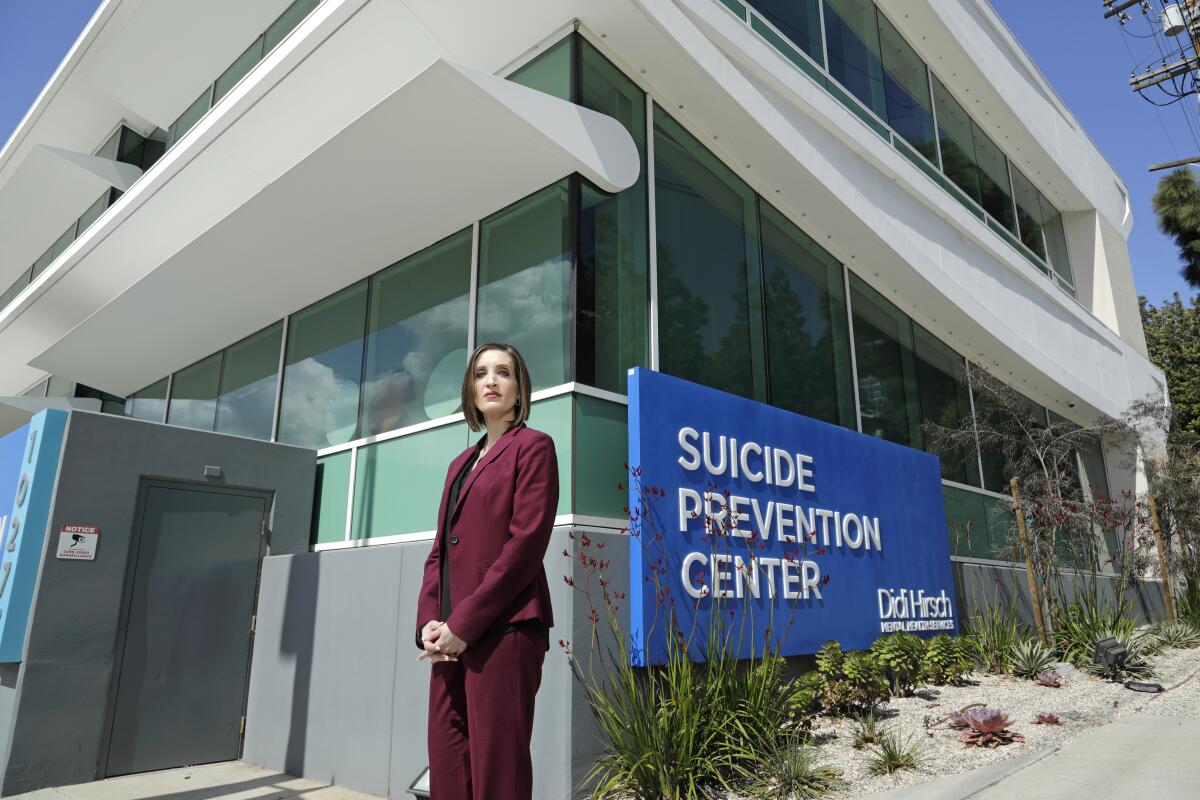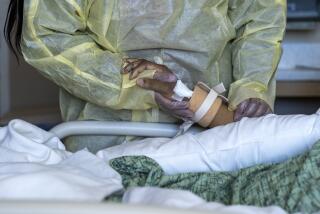L.A. suicide hotline sees rise in coronavirus-related calls. Counselors feel the pain

- Share via
The voice on the other end of the line was filled with panic.
The woman on the phone had come back from the market with a dry cough; she was worried about having COVID-19, worried that she could infect her husband and her children. For a brief moment, she’d forgotten her fears and embraced her kids.
“Now I’m afraid they may have gotten it from me,” she said.
April Rosas comforted the woman the only way she could — over the phone from a small gray cubicle on the third floor of the Didi Hirsch Suicide Prevention Center in Century City.
Her children “were in need of love,” the caller said. “They were not doing OK, so I hugged them.”
“You did your role as a parent. You were there for them,” Rosas said. “That’s not a bad thing.”
The caller said she had been embarrassed to reach out. But she struggled with anxiety and had no one else to turn to.
“This is a safe place,” the 28-year-old crisis counselor reassured her. “Many people are reaching out, expressing your kind of concerns.”
But in an unusual turn of events, the crisis counselors at Didi Hirsch, whose job it is to reassure, need some reassurance of their own — because the coronavirus knows no boundaries.
As cases mount across the country, topping 300,000 on Saturday, so too do fear and anxiety — over getting COVID-19, over loved ones who have it, over jobs lost because of it. With each day of uncertainty that passes, mental health services are becoming increasingly vital. And strained.
In New York, which has more confirmed coronavirus cases than anywhere else in the U.S., Gov. Andrew Cuomo has stressed that “the mental health impact of this pandemic is very real.” More than 6,000 mental health professionals have signed up to provide free online services in the state.
At Didi Hirsch Mental Health Services, a nonprofit organization, crisis counselors fielded more than 1,800 calls related to COVID-19 in March, versus just 20 in February.
The top concerns? Anxiety and stress, health issues, relationships, loneliness and isolation. One in five COVID-19-related calls included “suicidal desire.” Although there has been only a slight uptick in overall call volume, Didi Hirsch is anticipating a huge increase in the coming months.
“We know that the longer this goes on, unfortunately, the more losses there will be — not just lives but also economic,” said Lyn Morris, senior vice president of clinical operations at Didi Hirsch. “And the more hopeless and helpless people become, the more at risk they are for substance use, depression and other mental health issues.”
For decades, Didi Hirsch crisis counselors have provided comfort to hundreds of thousands of people calling the Disaster Distress Helpline and the National Suicide Prevention Lifeline. They take about 130,000 calls and chats per year and have seen callers through recessions, hurricanes and the death of loved ones.
The agency, which provides free mental health, substance-use disorder and suicide prevention services, has locations throughout Los Angeles and Orange counties.
In the last month, crisis counselors have experienced a dramatic shift in what callers want to talk about.
Rosas has heard from elderly people who haven’t left home and feel isolated.
“I just feel so lonely,” they say. “How do I deal with this loneliness?”
She has listened as parents have vented anxieties about their children.
After six years working as a crisis counselor, Rosas knows the importance of just being there for callers — especially right now.
“Some of them do want to hear they’re going to be OK. Unfortunately that’s not something that we can really say, because we can’t predict what’s going to happen next,” Rosas said. “But just letting them know, right now you’re OK, we’re taking things one minute at a time, and that’s all that we can do.”
For those already struggling with mental health issues, like the mother who called Rosas, the fear among counselors is that the pandemic could exacerbate their symptoms. So hundreds of staff and volunteers who answer calls, in English, Spanish and Korean, put aside their own worries to help those in need.
On March 27, Carolyn Levitan, director of Didi Hirsch’s crisis line, took nearly a dozen calls — all related to the coronavirus in some way. People were worried about their own safety and well-being, their children, job loss, car and mortgage payments.
“I’m worried if my utilities will continue if I can’t pay,” one caller said. “Will I still get power and water?”
Levitan spoke with someone worried about their grandmother. The call made her worry about her own 90-year-old grandmother, locked down in a care home. After her shift, Levitan called her.
Another counselor took a call from someone worried about job loss; the counselor understood — a family member was in the same situation.
“We’ve never experienced a time where all of our counselors are dealing with some of the same fears and anxieties that our callers and chat visitors are,” Levitan said.
At the same time, counselors have been dealing with the risk of the coronavirus spreading in the center. Didi Hirsch has been providing telehealth and telepsychiatry services but is still working on moving the entire call system off-site to enable counselors to work remotely.
Even with additional precautions, such as taking temperatures, physical distancing among dozens of cubicles and deep cleaning the building multiple times each day, about 40 people had to be placed in quarantine recently after a staff member and a volunteer tested positive for the coronavirus. No one they came in contact with at the center has contracted the virus so far.
“These types of situations put our own staff and volunteers in crisis somewhat,” Levitan said. And crisis-line directors across the country, she said, are dealing with the same types of concerns and fears.
“We’re a crisis line of people that can sometimes feel in crisis during this time.”
Despite that, volunteers and staff are asking to do more. Those who can’t come into the office are offering to work remotely, staffing the online Crisis Chat, a service for those who might not want to talk on the phone. Managers are picking up four to six shifts a week.
“People feel really helpless in a time like this, and we feel like we don’t have any control,” Levitan said. Taking calls and being able to help community, she said, “reduces our anxiety as well.”
::
In early-morning darkness last week, Rosas drove half an hour from Lakewood to the Didi Hirsch center for her regular graveyard shift. When she got in around 12:20 a.m., she used a no-touch thermometer in the building and, after logging her temperature, went upstairs.
She headed for her favorite booth, feeling soothed by the presence of the nearby window. After sanitizing the cubicle and her headset with Clorox wipes, she clicked “ready” on her computer and waited for the calls to come in.
Volunteers get close to 100 hours of training before they start taking calls. They are taught to listen, ask questions and be emotionally supportive through validation and empathy. They admit they don’t have all the answers, but they try to provide whatever resources they can.
Counselors don’t self-disclose and at times find themselves saying, “I can’t imagine how difficult that is for you,” even when — in reality — they can.
Over the last weeks, Rosas has found herself comforting front-line workers. There are nurses worried over a lack of protective equipment and co-workers who have tested positive. People whose spouses work in healthcare, prompting fears that the family will contract the virus.
Rosas works hard to validate callers’ concerns and help them understand they are not alone. Together, they try grounding techniques.
“Why don’t we take a few deep breaths together,” she tells them.
She practices the same in her own life, checking in with herself when she starts to feel anxious and reaching out to loved ones. On Tuesday, after working her shift, she learned she might have been exposed to the coronavirus at the center.
If you or someone you know is feeling suicidal, call the National Suicide Prevention Lifeline at 800-273-8255. For the Disaster Distress Helpline, call 800-985-5990.
As she waits to hear if that person tests positive, Rosas has tried to stay upbeat. She won’t be making calls at the center until the test results come back, but she can answer chats remotely.
“If it’s not us, then who is it going to be?” Rosas asked. “People still need these services; they still need to be able to have a safe place to reach out to someone. If I can be that for another person, even if it’s one person a day, then I did my job. I did enough.”
That, she said, is what keeps her going.
More to Read
Sign up for Essential California
The most important California stories and recommendations in your inbox every morning.
You may occasionally receive promotional content from the Los Angeles Times.









